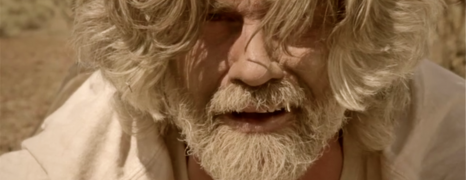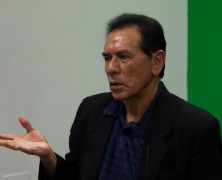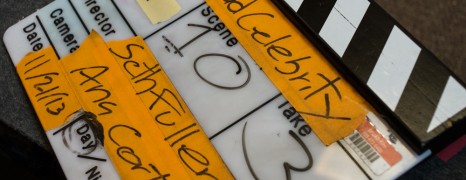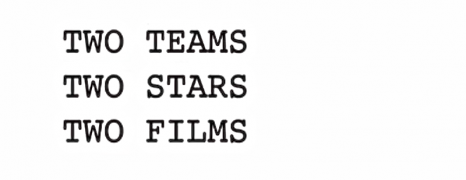Actor Daniel Williams fits the cowboy type, the outdoorsy type, the “old creepy man” type and the professor type. He has swaggered about in “Longmire’s” Red Pony Solon, taken advice from Morgan Freeman in Transcendence (opening April 18, 2014), and even stepped into the sandals of Apollo and the boots of a Neverland pirate. He’s a retired air force officer, martial artist, teacher and New Mexico traveling man who puts family first, his acting career second, his photography career third, and never misses an opportunity to work with students— especially those here at SFUAD’s Film School.
Directing Studi
posted by Nicholas Beckman
“It must be a dictatorial role,” actor Wes Studi says of directing, during a Feb. 5 visit to Hank Rogerson’s directing class.
That’s a Wrap!
posted by Charlotte Martinez
Shoot the Stars wraps production at Santa Fe University of Art and Design. Members of the Film Department, and the stars and directors of Mister Stapleton and Dead Celebrity discuss their experiences.
2013 Launch of Shoot the Stars
posted by Charlotte Martinez
Tuesday, Sept 24, Film School Chairman Chris Eyre officially announced this year’s Shoot the Stars scripts, directors and producers. Two teams, two stars, two films! “These were extremely difficult selections,” Eyre writes in his email to film students, some of whom were disappointed not to see their names on the list of directors and producers. “We have so many talented students here at The Film School,” Eyre continues, “Hollywood, of course, is a place where ‘no’ is said a lot more than ‘yes.’” Last year, Eyre initiated the first of the Shoot the Stars projects, announcing that every year in November the Film School would hire two well-established “star” actors to work under two student-assembled film crews. The product would be two short films, produced entirely by the Santa Fe University of Art and Design Film School. For seven students, the announcement of scripts, directors and producers was taken with relief and great anticipation. “I’m dying to be a director,” says Joshua James, the official director for Baxter Smith’s screenplay, Mister Stapleton. When he was called for his interview, James explains, he didn’t know what to expect. “The email said you had to have a pitch ready…but when I got in there, it wasn’t so much a pitch as it was a conversation.” Similarly, Bonnie Burchfield, the Producer for Mister Stapleton, describes the interview with Assistant Chair Paula Amanda and Hank Rogerson, film production instructor, as a conversation between acquaintances.“It was very calm,” Burchfield says. “I didn’t feel like I was going into a tense situation. Hank has such a warm vibe about him anyway, he’s so soothing that it made me feel really confident.” Hank Rogerson, in charge of Shoot the Stars’ production team, explains that in selecting candidates for director and producer “faculty goes by class experience,… applications, GPA, and year. And then,” Rogerson adds, “it comes down to how they present themselves in the interview, through preparation, presentation and vision.” As upper classmen, both James and Burchfield share the benefit of having worked with the Film School staff. In anticipation of Shoot the Stars 2013, they’ve directed and produced their own students films. “What made the final selections stand out,” Rogerson says, “was how much they presented a whole package—from vision for the projects to track record in the department.” For those unfamiliar with the tasks of a film producer, Burchfield considers it the job suited for “real problem solvers.” “They’re there to do the business end,” she says. “The end that the director doesn’t want to think about.” In charge of budget for pre-production, production and post production, Burchfield says, “they stay with it through to the end, into marketing, into the film circuit.” The problem solving, Burchfield describes, comes in when the director’s vision does not match the boundaries of the budget. “They have to provide other options,” Burchfield says, “that stay within the creative vision of the director.” Speaking of directors, Joshua James, a senior of the Film School, says he had been thinking of signing up for Shoot the Stars since January. In anticipation, James directed and produced a student film in the Spring called Nightmares and Daydreams in hopes the addition to his resume would give him a leg up. With plenty of film directing under his belt, James says his theater background, five years acting and directing plays in high school, also came up during his interview. “Mister Stapleton is written a lot like a play,” James says. “Baxter described it as kind of a gloried sketch that can be performed live if it weren’t for particular elements. When Chris [Eyre] told me that I got the position, he told me that my theater experience was a big reason for it. He thought I’d be comfortable with the actors and I’d have a good understanding of how to communicate with them.” Terry Borst, screenwriting instructor for the Film School and...
Eyre in the Family
posted by Nicholas Beckman
This article is part of a series of stories covering SFUAD’s new scholarship opportunity, The Robert Redford/Milagro Initiative scholarship, and the key players who have been vital to its success. “It’s all about networking,” Chris Eyre said, reflecting intently on his past 20 years in the film industry. Eyre, chairman of SFUAD’s Film School, spoke with such emphasis and humble pride about the path he has taken since attending NYU’s Master’s Program, that it appeared as if in this particular moment he had just put it all together, making sense of the incredible journey. Granted, as someone who had the life-changing opportunity to have his own creations workshopped and mentored by some of the movie-businesses’ finest as part of the Sundance Institute’s Director’s Lab, Eyre is no stranger to the intense and often unnerving world of independent film. “Ride the wave,” Eyre says. “That’s all you can do.” The wave Eyre refers to is the success into which he so modestly stepped when he met Robert Redford at the Sundance Institute. Eyre describes his first meeting with Redford as both daunting and, quite frankly, a little awkward (for Eyre, that is). Redford was reviewing the piece Eyre had written and created during his stay at the Sundance Labs. Eyre recalls Redford’s criticism as constructive and founded in years of knowledge of the craft, but there was only one problem: Eyre’s film was already finished. There was no time or resources to go back, re-shoot and fine-tune his work into a Redford-approved masterpiece. Eyre best described his reaction to this critique with a giant gulping “Huh?!” However, after spending time with Redford and learning more about the evolution of a filmmaker’s skill-set, Eyre found that those critiques were not calls-to-action, but solid advice for the...






 Jackalope Magazine is the student magazine of Santa Fe University of Art and Design. Building on the interdisciplinary nature of our education, we aim to showcase the talent of our university and character of our city.
Jackalope Magazine is the student magazine of Santa Fe University of Art and Design. Building on the interdisciplinary nature of our education, we aim to showcase the talent of our university and character of our city.
Recent Comments